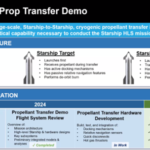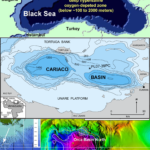In this month’s Report on Business Magazine, a supplement that comes with The Globe and Mail, one of Canada’s national newspapers, Stanford University’s Mark Jacobson provides a best case scenario for powering our planet in the year 2030. A civil and environmental engineer, Jacobson states that the only thing impeding this outcome is “lobbyists and special interest groups, particularly from the energy companies that would stand to lose from a conversion.”
Jacobson’s energy mix includes wind, concentrated solar (molten salt heated by solar mirrors), photovoltaics, geothermal, tidal and wave, and hydroelectricity. No coal fired power plants. No natural gas plants. and no nuclear.
To meet a world powered completely by sustainable renewable energy we would use approximately 1% of the total Earth’s surface, an area approximately the size of the Canadian province of Quebec.
What would be in the mix?
- 3.8 million, 5-Megawatt off and onshore wind turbines;
- 49,000, 300-Megawatt concentrated solar power plants;
- 40,000, 300-Megawatt solar photovoltaic power plants;
- 1.7 billion, 3-Kilowatt rooftop photovoltaic systems;
- 5,350, 100 Megawatt geothermal power plants;
- 270, new 1,300 Megawatt hydroelectric power plants;
- 720,000, 0.75 Megawatt wave energy devices;
- 490,000, one Megawatt tidal turbines.
These renewable sources would produce 17 trillion watts in total.
Jacobson recently provided an alternative energy future plan to Governor Andrew Cuomo of New York State in which he laid out a plan to achieve 100% renewable energy by 2030. He lays out ideas for legislation and policies that New York could use to achieve such a goal. He also provides detailed costs over a 17 year period and shows shows the reduction in carbon emissions that would result as coal, natural gas and other fossil fuel energy power plants go offline. For New York to switch to renewable energy sources for electricity would mean ending an almost 100% dependence on imported oil, coal and gas. In the proposed energy mix 40% would come from local wind power, 38% from local solar and the balance from a combination of hydroelectric, geothermal, tidal and wave energy.
Jacobson’s plan looks at transportation as well. By 2030 all vehicles would be electric or powered by hydrogen-fuel cells. Homes would be retrofitted to use geothermal heat pumps and heat exchangers rather than natural gas and oil for heating and air conditioning. Solar water heaters would be in common use. And industry would switch as well to rely on geothermal, hydrogen, solar and a mix of on and off-grid energy sources.
The plan also includes a comprehensive smart grid management system to smooth out variability from renewable power sources, the chief concern in moving away from a reliance on coal, natural gas and oil-fired power plants. These smart grid system would time match industry and residential power requirements with output from the renewable energy mix to meet peaks and valleys that occur with daily and seasonal energy demand.
I have often stated in previous postings on energy that we need vision and leadership and the equivalent effort of a number of Manhattan Projects to globally reduce our carbon footprint.
Jacobson along with other environmental engineers are providing with the road map we need to implement. What will it take? Governments that have the resolve to enact policy to make rooftop photovoltaic and other renewable systems mandatory for any new housing or redevelopment projects.And of course we need the commercial sector to put creative hats on and come up with marketable solutions that make renewable energy a zero-sum game for industry and household use. Some companies are stepping up as are some governments. Jacobson and his team have recently been asked to create similar plans for California and Washington.

















[…] Renewable Energy Symbol | Read Sources […]